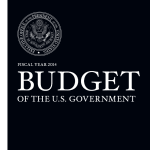Both parties are putting political spin on the deficit reduction contained in President Obama’s $3.78 trillion budget plan.
Issues: budget
Ted’s Twisted History
In Sen. Ted Cruz’s twisted vision of economic history, Ronald Reagan cured double-digit unemployment by cutting spending and reducing the federal debt, and Jimmy Carter was guilty of “out-of-control regulation.”
In the real world:
Total federal spending soared during Reagan’s deficit-plagued first term, and the national debt nearly doubled. His budget director later resigned and wrote a book criticizing Reagan’s failure to cut spending.
And Carter signed landmark bills freeing airline, railroad and trucking rates from federal regulation,
Palin’s Constitutional Stretch
At the Conservative Political Action Conference, former Alaska Gov. Sarah Palin said that the Senate was “in violation of Article I, Section 9, Clause 7 of our U.S. Constitution” by failing to “pass a budget.” She’s referring to a budget resolution. But that constitutional clause doesn’t mention a budget or a budget resolution, which was not required of the Senate until the 1974 Congressional Budget Act. The responses to Palin’s interpretation from constitutional scholars ranged from “completely invalid” to “kind of a stretch.”
Charting Ryan’s Debt Exaggeration
Rep. Paul Ryan exaggerates future growth of the federal debt in a chart contained in his newly released budget plan.
The chart relies on Congressional Budget Office projections from last year that do not account for actions taken since then to reduce federal deficits by nearly $2 trillion over 10 years. The chart also projects debt levels out to 2060, although CBO warns that such long-term projections are “highly uncertain.”
Ryan, a Wisconsin Republican who chairs the House Budget Committee,
Reid Twice Wrong on $2.6 Trillion ‘Cuts’
Sen. Harry Reid was doubly wrong when he claimed that Congress already has cut $2.6 trillion from projected future deficits by reducing “non-defense programs” alone.
In fact, legislation he refers to applied to both security and non-security spending. Furthermore, a good chunk of the deficit reduction came from tax increases, not spending cuts.
Reid made the claim — twice — on ABC’s “This Week” on Feb. 3, in support of his argument that further deficit reduction should include more tax increases and cuts in military spending.
Fiscal Cliff Air Wars
The presidential election ended last month, but the partisan air wars continue with competing fiscal cliff ads from the conservative Crossroads GPS and the Democratic Congressional Campaign Committee. Most of what is in the ads falls into the realm of opinion, but we found a couple points to quibble with in each.
The DCCC ad claims “tea party House Republicans are holding the middle class hostage to get more tax cuts for millionaires,” but nearly six out of seven who would face tax increases under President Obama’s plan do not earn $1 million a year.
Chained Explained
Romney’s Economic Exaggerations
Republican presidential candidate Mitt Romney claims that his plan would balance the federal budget in eight to 10 years. But so far, he has not made public the details on how he would be able to do that, and one neutral budget expert calls it “an unrealistic goal.”
Also, Romney and running mate Paul Ryan exaggerate when they say “five different studies” prove that all of the stated goals of Romney’s revenue-neutral tax plan could be accomplished without raising taxes on middle-income taxpayers.
About Those ‘Republican Cuts’
GOP Attack on Tim Kaine’s ‘Shortfall’ Falls Short
A conservative group claims former Virginia Gov. Tim Kaine “left us with a $4.2 billion shortfall.” Not exactly. The state did face a $4.2 billion gap in the biennial 2010-2012 budget, but Kaine submitted a balanced budget proposal days before leaving office, as required by law.
And the last budget Kaine signed into law ended with a surplus. In fact, Republican Gov. Bob McDonnell praised Kaine for making “tough cuts” in state spending and relying on “conservative”









